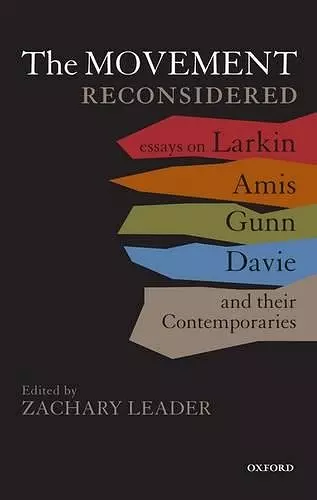The Movement Reconsidered
Essays on Larkin, Amis, Gunn, Davie and Their Contemporaries
Format:Hardback
Publisher:Oxford University Press
Published:7th May '09
Currently unavailable, and unfortunately no date known when it will be back
This hardback is available in another edition too:
- Paperback£28.99(9780199601844)

The Movement was the preeminent poetical grouping of post-war Britain. 'We shall have stamped our taste on the age between us in the end', boasted its most important poet, Philip Larkin, of his and Kingsley Amis's influence. That Larkin's boast proved well-founded even those who deplored Movement taste have agreed. According to Randall Stevenson, author of volume 12 of the Oxford English Literary History, English literature 'was never more static than under the influence of the Movement. If the later twentieth century proved a difficult period for poetry, it was in large measure because it took so long to realise this, and move on.' Moving on, though, was just what the Movement writers - Larkin, Amis, Thom Gunn, Donald Davie, Robert Conquest, John Wain, D.J. Enright, Elizabeth Jennings, and John Holloway - thought they were doing, even when deploring innovation and experiment. Was their influence, as detractors claim, stultifying, a lament for 'England gone'? What, moreover, of other charges: that Movement writing is dry, academic, insular? These accusations are as extreme as the anti-modernist accusations that sparked them, in particular those of Amis, Larkin, Conquest, and Davie. The Movement Reconsidered, a collection of original essays by distinguished poets, critics, and scholars from Britain and America, sets out to show not only that relations between Movement and other post-war British writers were more complex and nuanced than is usually suggested, but that the role these relations played in shaping the current literary scene is important and complicated. Other topics it examines include the origins of the grouping; the role of mediating figures such as Auden, Empson, and Orwell; the part the writers themselves played in promoting the grouping; the interlocking network of academics, journalists, and editors who aided them; and analogous developments in other fields, notably philosophy, politics, and language. The book's ultimate aim is to encourage readers to come to Movement writing with fresh eyes and to gain a fairer sense of its range and power.
Excellent * D. J. Taylor, Times Literary Supplement *
It should be read. * Nicholas Haslam, The Spectator *
The best essays here are robust in address, firm in judgment, and alert for the deflating hatpin behind the arras. It's seldom you get to use the word 'rollicking' of semi-academic literary criticism, but some of these earn the epithet. * Sam Leith, The Spectator *
The most absorbing essay in the book... is Terry Castle's "The Lesbianism of Phillip Larkin"... Castle shows that it's possible to write wittily and sensitively about aspects of Larkin's life that usually get treated with horror, jeers or indignant defensiveness. * Christopher Tayler, The Guardian *
Many good essays in this collection * Stefan Collini, London Review of Books *
Expertly compiled * The Observer *
The most useful critical guide to the Movement that has appeared in recent years... * Alan Brownjohn, Literary Review *
What these essays share, beyond their subject matter, is the ability to write jargon-free prose thay makes room for the human character of both of the writers under discussion and the essayists themselves. In the first place, this gives readings that are as lucid as they are perceptive * Oxford Today *
ISBN: 9780199558254
Dimensions: 146mm x 223mm x 30mm
Weight: 508g
346 pages